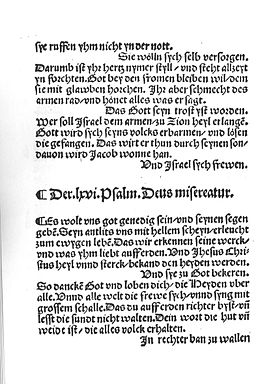| "Es woll uns Gott genädig sein" | |
|---|---|
| Hymn by Martin Luther | |
 "Es wolt uns got genedig sein" in the Erfurt Enchiridion, 1524 "Es wolt uns got genedig sein" in the Erfurt Enchiridion, 1524 | |
| English | May God be gracious to us |
| Catalogue | Zahn (7246)–7247 |
| Text | by Martin Luther |
| Language | German |
| Based on | Psalm 67 |
| Melody | by Matthias Greitter |
| Published | 1524 (1524) |
"Es woll uns Gott genädig sein" (May God be gracious to us, or more literally: May God want to be merciful to us) is a Lutheran hymn, with words written by Martin Luther based on the Psalm 67. The hymn in three stanzas of nine lines each was first published in Wittenberg in 1524. Its best known hymn tune, Zahn No. 7247, was published in Strasbourg in 1524. Heinrich Schütz and Johann Sebastian Bach wrote settings of the hymn. It was translated to English and has appeared in dozens of hymnals.
History
Luther wrote in a letter to Georg Spalatin, around the end of 1523, about the importance of writing "Deutsche Psalmen" (German psalms). Trying to win Spalatin for collaboration, he specifies:

"Neue und modische Wörter sähe ich gern vermieden; denn um die Gemeinde zu gewinnen, muss man ganz schlichte und volkstümliche, doch zugleich saubere und geeignete Wörter wählen, und der Sinn soll klar und möglichst psalmnah wiedergegeben sein. Deshalb muss man frei verfahren und den angenommenen Sinn ohne Rücksicht auf den Wortlaut durch geeignete Worte übertragen." (translation, from some time after 1996)
(I would like to see new and fashionable words avoided; for in order to win the congregation, one has to choose quite simple and popular words, but at the same time clean and suitable ones, and the meaning should be rendered clearly and as closely to the psalm as possible. Therefore one has to proceed freely and transfer the assumed meaning without regard to exact text by suitable words.)
Luther wrote "Es wolt uns got genedig sein" as a paraphrase of Psalms 67 in three stanzas of nine lines each. It was first printed in Wittenberg in 1524, first in a leaflet together with "Aus tiefer Not schrei ich zu dir”, a paraphrase of Psalm 130. It appeared then in Luther's Ein weyse Christliche Messe zu halten und zum Tisch Gottis zu gehen (A way to hold a Christian mass and to go to the table of God). It was published the same year in the Erfurt Enchiridion.
Lyrics
| German | Psalm (KJV) |
|---|---|
|
|
Melody and settings
Johann Walter's "Es woll uns Gott genädig sein" hymn tune, Zahn No. 7246, originally composed for another hymn, was published in 1524. That hymn tune, however, was from 1543 associated with the "Christ unser Herr zum Jordan kam" hymn. Another tune for the "Es woll uns Gott genädig sein" hymn, Zahn No. 7247, was published in 1524 in Strasbourg.
Heinrich Schütz set it as part of his Becker Psalter of all psalms in German. Johann Sebastian Bach used it as the basis for chorale preludes, and in cantatas such as his second cantata as Thomaskantor in Leipzig, Die Himmel erzählen die Ehre Gottes, BWV 76, when he closed part I with the first stanza and part II with the last.
Translation
The hymn was translated to English and has appeared in over 25 hymnals. A. T. Russell translated it as "May God unto us gracious be" and included it in his Psalms & Hymns, printed in 1851. Richard Massie translated it in 1851 to "May God bestow on us His grace".
Notes
- Enchiridion Oder eyn Handbuchlein, eynem yetzlichen Christen fast nutzlich bey sich zuhaben, zur stetter ubung unnd trachtung geystlicher gesenge, und Psalmen, Rechtschaffen unnd kunstlich vertheutscht. 1524, Der .lxvi. Psalm. Deus misereatur.
References
- ^ Browne 2011.
- Herbst & Hahn 2009, p. 25–26.
- Herbst & Hahn 2009, p. 27.
- BLC 2017.
- ^ Zahn 1891, pp. 344–345.
- Braatz & Oron 2009.
- ^ Hymnary 2020.
- Hymntime 2017.
Bibliography
- Braatz, Thomas; Oron, Aryeh (2009). "Chorale Melodies used in Bach's Vocal Works / Es woll (or wolle/wollt) uns Gott genädig sein". Bach-Cantatas. Retrieved 18 February 2017.
- Browne, Francis (2011). "Es woll uns Gott genädig sein / Text and Translation of Chorale". Bach-Cantatas. Retrieved 18 February 2017.
- Herbst, Wolfgang; Hahn, Gerhard, eds. (2009). 299 Aus tiefer Not schrei ich zu dir (in German). Vandenhoeck & Ruprecht. pp. 25–27. ISBN 9783525503393.
{{cite book}}:|work=ignored (help) - Dellal, Pamela (2012). "BWV 76 – "Die Himmel erzählen die Ehre Gottes"". Emmanuel Music. Archived from the original on 12 May 2008. Retrieved 31 May 2014.
- Dreisbach, Günther (2017). "Lieder Martin Luthers" (in German). Günther Dreisbach. Archived from the original on 2017-01-13. Retrieved 4 February 2017.
- "Martin Luther / Es wollt uns Gott genädig sein / Der Psalmus 67: "Deus misereatur nostri"". Der Spiegel. Retrieved 18 February 2017.
- "Es wollt uns Gott genädig sein". hymnary.org. Retrieved 17 March 2020.
- "May God bestow on us His grace". hymntime.com. Archived from the original on 17 May 2017. Retrieved 18 February 2017.
- "Evangelical Lutheran Hymnary Handbook / Hymn Texts and Tunes". hymntime.com. Retrieved 18 February 2017.
- Zahn, Johannes (1891). Die Melodien der deutschen evangelischen Kirchenlieder (in German). Vol. IV. Gütersloh: Bertelsmann.
External links
- Es woll uns Gott genädig sein: Scores at the International Music Score Library Project
- BWV 76.7=76.14 bach-chorales.com